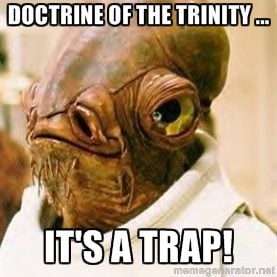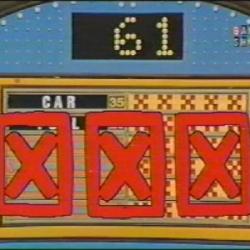It’s Trinity Sunday, so it’s time again for the annual warning that the doctrine of the Trinity is a trap.
The doctrine of the Trinity is a mystery. Or, more specifically, it’s an attempt at articulating mystery. You’re expected to affirm it, but anything you try to say beyond that can and will be used against you to convict you of heresy.
And pretty much anything you try to say beyond that will be a heresy, in some form, as this brilliant classic bit from Lutheran Satire reminds us:
You’re safest just reciting the creeds. They’re trinitarian, but they prudently avoid trying to say anything much about trinitarianism per se, because we can’t, really.
It’s a trap. The doctrine of the Trinity is an efficient machine for the manufacture of “heresies” — with “heresy” there being defined as a failure to define the infinite in the way that orthodoxy supposes it has somehow managed to do.
 One of the many things we’re not allowed to say about the doctrine of the Trinity is this: It’s a theory. A human theory. It’s an excellent theory that has, in many, many ways, proved useful and helpful. But it’s also an excellent human theory that over the centuries has shown, in many, many ways, that it cannot be a conclusive final word.
One of the many things we’re not allowed to say about the doctrine of the Trinity is this: It’s a theory. A human theory. It’s an excellent theory that has, in many, many ways, proved useful and helpful. But it’s also an excellent human theory that over the centuries has shown, in many, many ways, that it cannot be a conclusive final word.
In any discipline other than theology, that wouldn’t be a troubling thing to suggest. In physics, for example, no one imagines it to be in any way disrespectful to Isaac Newton or to Albert Einstein to discuss the limits of their not-wholly-compatible theories of gravity. Everybody understands that both theories are good and right and useful in many, many important ways, but that at the same time both theories are limited, conflicted and, in a sense, wrong in ways that we don’t yet fully understand.
We’ll keep relying on Newton’s physics to make airplanes that can and do fly and we’ll keep relying on Einstein’s physics to make telescopes and space probes that function properly, but no one would consider it a betrayal of physics or a heresy to explore the problems with those ideas and to seek a larger, more unified explanation. Physics, as a discipline, is permitted to learn and to get smarter in a way that theology, as a discipline, isn’t.
So, for example, consider this lovely passage from the 139th Psalm:
Where can I go from your spirit?
Or where can I flee from your presence?
If I ascend to heaven, you are there;
if I make my bed in Sheol, you are there.
If I take the wings of the morning
and settle at the farthest limits of the sea,
even there your hand shall lead me,
and your right hand shall hold me fast.
If I say, “Surely the darkness shall cover me,
and the light around me become night,”
even the darkness is not dark to you;
the night is as bright as the day,
for darkness is as light to you.
This is often cited as evidence of God’s omnipresence. We cannot flee from the presence of God because God is everywhere.
That’s beautiful, until we spring the trap. Is the first person of the Trinity everywhere or is this talking about the Holy Spirit? And what about the second person of the Trinity? There are many, many ways to try to answer such questions, but pretty much any one of them will get you in trouble with the heresy-making machinery of the doctrine of the Trinity.
This trap, then, discourages us from thinking about God, from trying to understand what God is like. As soon as we do so, some real-life variation of the obnoxious twins from that video above will show up to pedantically lecture us on which of the multitude of trinitarian heresies we’re in danger of committing.
And that brings me to one thing I can say, with certainty, about the nature of God. God is nothing at all like the twins in that video.












